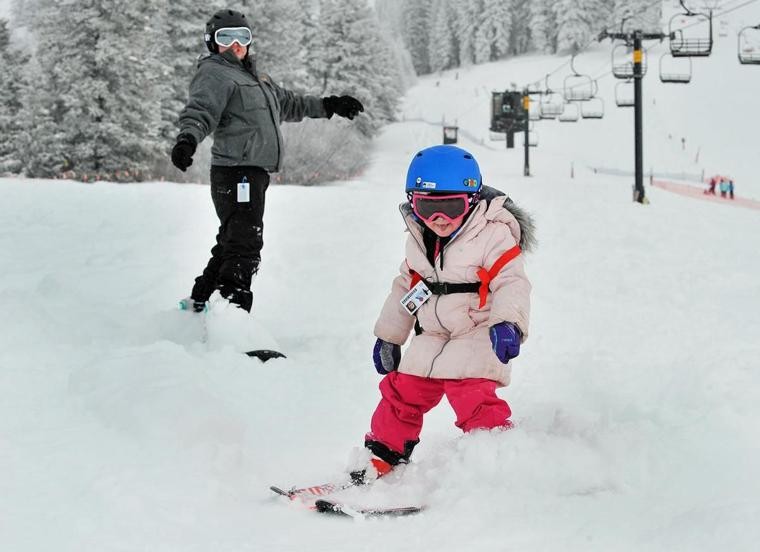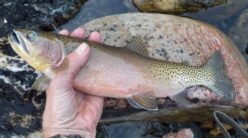All summer long the outdoor industry went berserk as people’s normal vacation plans were upset by a pandemic and replaced with camping, hiking, biking and other outside recreations.
Now a pandemic-laced winter is on the horizon, and some questions loom on how people are going to react to the changing recreational landscape and if outdoor gear suppliers will be ready or caught off guard in a similar way that bicycle suppliers were this past spring and summer.
“Particularly we’re seeing already an explosion in anything dealing with backcountry,” said Davin Napier, manager at Idaho Mountain Trading in Idaho Falls about recent winter recreation trends. “I get it, everyone is pretty uncertain about what the resorts are going to do fully. Even though (Grand) Targhee (Resort) says absolutely they are going to open. Kelly (Canyon Ski Resort) is on track. Everyone in the local area is, but a lot of people are taken to the (alpine touring) or backcountry aspect and that’s where we’re seeing a major pinch in available items.”
With the early closure of ski resorts in March because of the pandemic, backcountry ski hotspots such as Teton Pass were slammed with extra visitors.
Regional ski resorts plan to open as usual this winter, but with added precautions promising a different experience. Some resorts expect to limit numbers on the ski hill and at lodges. Outdoor retailers say changes at resorts may drive recreators to different activities, such as cross-country skiing and backcountry skiing and snowboarding.
“I think we’ll see a big boom in Nordic this winter,” said Scott Hurst, manager of the Outdoor Resource Center at Brigham Young University-Idaho. “I’ve heard from Rossignol and Alpina that their Nordic is all sold out for the season already as far as from the manufacturers. My Rossignol rep told me they were oversold in some categories for their Nordic. The Alpina rep said they have a feeling that Nordic is going to be like bicycles were this past summer. Because you can do it by yourself and it doesn’t require any special equipment, it’s good for social distancing and it’s a great way to exercise outside of the gym with the COVID still going around.”
Taylor Houck, of Idaho Falls, said via Facebook that the pandemic would be changing her winter recreation plans.
“I chose not to purchase a ski pass this year at (Grand Targhee) partially because they shut down early last year and partially because their social distancing protocols add more challenges that I don’t want to deal with,” Houck said. “I will be replacing that winter activity with others however.”
Yostmark Mountain Equipment in Driggs reports seeing a spike in interest in backcountry skiing and snowboarding recently.
“Equipment, avalanche courses, education has skyrocketed,” said Yostmark co-owner Rich Rinaldi. “With the pandemic that hit in March, lift skiing was closing and the uncertainty of lifts running, etc. People figured, ‘I’ll climb the mountain and ski it.’ Simple as that.”
Both Rinaldi and Napier said certain specialty items needed for backcountry adventures have or will become harder to acquire from manufacturers, such as some specialty bindings and avalanche airbags. Most items are available now, but may not be here later in the winter season. Interest in avalanche courses has also increased.
“We always host an avalanche class — an avy 1 or avy 2 class — here in the store,” Napier said. “We have from six to 12 people. … By this point I would normally have maybe two or three interests in an avy class. They’re not inexpensive – $450 bucks generally. It’s a couple of nights here and then a Saturday and Sunday field training at Teton Pass. … What’s interesting is I’ve already had two dozen interested. There are all these telltale signs of the influx. It’s going to be interesting.”
Barrie's Ski & Sports in Pocatello notes the same trend.
“Year after year we have been seeing more people interested in that level of skiing,” said Nick DeTore, a bike and ski tech at Barrie's. “The companies are making more of that style of equipment, too. It used to be a high price point, but now they’re making a lot more entry-level setups just because the market for that has grown so much over the past couple of years. This year seems to be shaping up the same way.”
The new outdoor retailer in Idaho Falls, Al’s Sporting Goods, sees a similar view.
“We’ve seen an increased interest in backcountry skiing as well as cross-country skiing,” said Dustin Peterson in Al’s bike and ski department. “That also includes splitboarding for snowboarders out there. I think as we get into the season, if we see an increased interest as we did with bikes, it’s going to be really hard to get that stuff. Normally by the end of December, we’re pretty scarce on equipment.”
Cross-country skiing is also seeing an upward trend. DeTore said when the snow comes, his shop “will rent out our entire fleet of Nordic skis every weekend. We have 75 sets of cross-country skis; all the adult ones will be rented out.”
For some, the momentum carried over from summer outdoor activities will continue into winter.
“We plan on doing a lot more cross-country skiing, and I would love to learn how to snowshoe,” said Idaho Falls elementary teacher Heidi McJunkin via Facebook.
Joe Hill, co-owner of the Sled Shed shop in Rexburg, said his shop has received increased orders to supply the city with cross-country skis for its operation at Teton Lakes Golf Course. “The popularity just keeps on growing,” he said.
Zoom towns
Another interesting recreational trend affecting eastern Idaho is called “Zoom towns.”
The COVID-19 pandemic has sent many remote workers away from crowded cities, some temporarily, others more permanently. National Public Radio defines Zoom towns as housing markets that are booming as remote work becomes more popular or necessary. Remote workers are leasing out their homes or apartments in cities such as San Francisco and moving to places such as Driggs, Sun Valley, Jackson, Wyo., or even Idaho Falls, to give them access to a nearby ski resort, more space, outdoors, less traffic and nature. They retain their big-city salaries and prosper with a small-town setup.
Forbes magazine said, “Recent trends in the real estate market reflect this shift: Rental vacancies are surging and rental costs are declining in urban areas — as housing prices are increasing and inventory is becoming more scarce in suburbs and rural areas.”
The trend has been noticed in Driggs.
“Driggs definitely has a lot more people moving here this winter. Just because everyone is able to work remotely so why not move to a ski town, kind of vibe,” said Heidi Marquart, a bike and ski tech at Peaked Sports in Driggs. “We’re seeing that. We’re getting more people moving here that would probably have not moved here had COVID not hit.”
Marquart said her shop reported seeing more new faces this summer with people renting mountain bikes and expects to see them again renting skis and snowboards. She wonders how many will last after they get a taste of a real mountain winter.
“I’ve noticed people moving here, and they’re already complaining about how cold it is,” she said. “I’m thinking just you wait. It’s barely been freezing. … The overall vibe with Driggs is that it’s busier than it has ever been as far as people here.”



